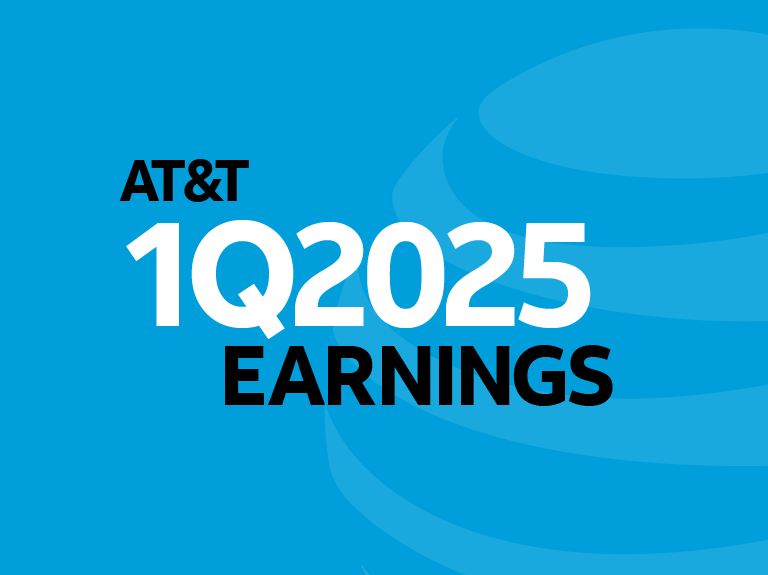AT&T Reports Third Quarter 2020 Results
Solid wireless and fiber subscriber gains reflect resiliency of core connectivity businesses;
free cash flow guidance updated; debt reduction continues
- Consolidated revenues of $42.3 billion
- Cash from operations of $12.1 billion
- Capital expenditures of $3.9 billion; gross capital investment of $4.5 billion1
- Free cash flow of $8.3 billion; total dividend payout ratio of 45%2
- Diluted EPS of $0.39 as reported compared to $0.50 in the year-ago quarter
- Adjusted EPS of $0.76 compared to $0.94 in the year-ago quarter
- Includes COVID-19 impacts of ($0.21): ($0.02) of incremental costs and ($0.19) of estimated revenues
Note: AT&T’s third-quarter earnings conference call will be webcast at 8:30 a.m. ET on Thursday, October 22, 2020. The webcast and related materials will be available on AT&T’s Investor Relations website at https://investors.att.com.
AT&T Inc. (NYSE:T) reported third-quarter results that showed solid subscriber growth in the company’s market focus areas of wireless and fiber broadband while continuing to reflect strong cash flows, financial strength and business resiliency. The company also updated guidance and now expects 2020 free cash flow of $26 billion or higher, with a dividend payout ratio in the high 50s%.2
Third-Quarter Highlights
Communications
- Mobility:
- More than 5 million total domestic wireless net adds
- More than 1 million postpaid net adds, including 645,000 postpaid phones (phones include 151,000 Keep Americans Connected Pledge (KACP) paying accounts)
- 245,000 prepaid net adds, including 131,000 prepaid phone net adds
- Postpaid phone churn of 0.69%, significant improvement year over year (0.77% when excluding KACP paying accounts)
- Service revenues down 0.3% due to decline in international roaming; equipment revenues up year over year
- Fastest nationwide 5G network and, for the 7th consecutive quarter in a row, the fastest network in the nation3
- Entertainment Group:
- A record high 357,000 AT&T Fiber net adds and 158,000 total broadband net adds (includes 28,000 and 104,000 KACP paying accounts, respectively).
- Solid IP broadband and video ARPU gains
- AT&T TV gains helped offset premium TV loss
- 590,000 net loss, the result of lower churn and higher quality base (includes 116,000 KACP paying accounts)
WarnerMedia
- Total domestic HBO and HBO Max subscribers4 top 38 million and 57 million5 worldwide, respectively
- 38 million exceeds previously announced year-end target of 36 million
- HBO Max activations more than doubled from second-quarter levels
- HBO Max advertising-supported service on track to launch in 2021
- Industry-leading 38 Primetime and 15 News and Documentary Emmy Awards
- Results impacted by the COVID-19 disruption and return of sports programming in the quarter
“We delivered a solid quarter with good subscriber momentum in our market focus areas of connectivity and software-based entertainment,” said John Stankey, AT&T chief executive officer. “Wireless postpaid growth was the strongest that it’s been in years with one million net additions, including 645,000 phones. We added more than 350,000 fiber broadband customers and are on track to grow our fiber base by more than 25% this year. And we continue to grow and scale HBO Max, with total domestic HBO and HBO Max subscribers topping 38 million — well ahead of our expectations for the full year. Our strong cash flow in the quarter positions us to continue investing in our growth areas and pay down debt. We now expect 2020 free cash flow of $26 billion or higher with a full-year dividend payout ratio in the high 50s%.”
Consolidated Financial Results
AT&T’s consolidated revenues for the third quarter totaled $42.3 billion versus $44.6 billion in the year-ago quarter. The COVID-19 pandemic impacted revenues across all businesses, particularly WarnerMedia and also domestic wireless service revenues, primarily from lower international roaming. For the quarter, revenue declines included domestic video, Warner Bros. television and theatrical products, legacy wireline services and Latin America due to foreign exchange pressure. These declines were partly offset by higher wireless equipment revenues and higher advertising revenues associated with timing shift of sports from the first half of 2020.
Operating expenses were $36.2 billion versus $36.7 billion in the year-ago quarter. Expenses decreased from lower Entertainment Group costs, lower Warner Bros. film and television production costs associated with lower revenues, and foreign exchange impacts on Latin America expenses. These decreases were partly offset by higher Turner programming costs due to the shift of sports from the first half of the year, higher HBO Max investments, incremental COVID-19 costs and higher subscriber acquisition and fulfillment costs.
Operating income was $6.1 billion versus $7.9 billion in the year-ago quarter, due to the impact of lower revenues and operating expenses and incremental COVID-19 costs. Operating income margin was 14.5% versus 17.7% in the year-ago quarter. When adjusted for amortization and other items, operating income was $8.2 billion versus $9.9 billion in the year-ago quarter, and operating income margin was 19.4% versus 22.2% in the year-ago quarter.
Third-quarter net income attributable to common stock was $2.8 billion, or $0.39 per diluted common share, versus $3.7 billion, or $0.50 per diluted common share, in the year-ago quarter. Adjusting for $0.37, which includes merger-amortization costs, debt redemption premiums and other items, earnings per diluted common share was $0.76 compared to an adjusted $0.94 in the year-ago quarter. The company did not adjust for ($0.21) of impacts from COVID-19, including ($0.02) of incremental costs and ($0.19) of estimated revenues.
Cash from operating activities was $12.1 billion, and capital expenditures were $3.9 billion. Gross capital investment – which consists of capital expenditures plus cash payments of more than $600 million for vendor payments – totaled $4.5 billion. Free cash flow – cash from operating activities minus capital expenditures – was $8.3 billion for the quarter. Net debt declined by $2.9 billion sequentially in the quarter, and net debt to adjusted EBITDA at the end of the third quarter was 2.66x.6
Guidance
The company expects 2020 free cash flow of $26 billion or higher with a full-year dividend payout ratio in the high 50s%.2 The company also continues to expect gross capital investment in the $20 billion range in 2020.1



